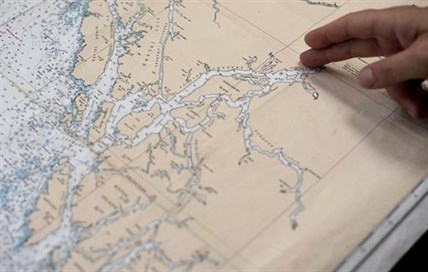
The proposed tanker route leaving from Kitimat, B.C. is show on a map Thursday, Sept, 19, 2013. Some time in the next 10 days, the federal government is supposed to announce its final decision on the Northern Gateway pipeline - the multibillion-dollar political minefield dividing the West.
Image Credit: THE CANADIAN PRESS/Jonathan Hayward
July 10, 2014 - 5:30 PM
VANCOUVER - British Columbia First Nations are wasting no time in enforcing their claim on traditional lands in light of a landmark Supreme Court of Canada decision recognizing aboriginal land title.
The hereditary chiefs of the Gitxsan First Nations served notice Thursday to CN Rail, logging companies and sport fishermen to leave their territory along the Skeena River in a dispute with the federal and provincial governments over treaty talks.
And the Gitxaala First Nation, with territory on islands off the North Coast, announced plan to file a lawsuit in the Federal Court of Appeal on Friday challenging Ottawa's recent approval of the Northern Gateway pipeline from Alberta.
The Kwikwetlem First Nation also added its voice to the growing list, claiming title to all lands associated with now-closed Riverview Hospital in Metro Vancouver along with other areas of its traditional territory.
They cite the recent high court ruling in Tsilhqot'in v. British Columbia.
"It's given us a bit of confidence that things are going to be going our way," said Clarence Innis, acting chief of the Gitxaala. "I think that is a very strong message to Canada ... not to ignore First Nations any more but to consult."
The court application argues that the federal Conservative cabinet did not consider the Gitxaala's aboriginal rights and title in approving the oil pipeline proposed by Calgary-based Enbridge. The Tsilhqot'in decision bolsters their case, said Rosanne Kyle, the band's lawyer.
"The Northern Gateway project is going to be the first case where the implications of Tsilhqot'in will crystallize," she said. "The court has provided a lot more clarity for everyone involved, including government, as to what needs to be done to achieve reconciliation."
About 250 kilometres northeast of the Gitxaala, the Gitxsan have given companies operating on their land until Aug. 4 to leave the 33,000 square kilometres of their territory along the Skeena River.
Because the band was not consulted by government, the companies the governments licensed are trespassing, said Gwaans Bev Clifton Percival, chief negotiator for the Gitxsan.
"The Supreme Court has come down with yet another ruling that advances our right and title," she said. "They (government) have to abide by the laws. We're prepared to negotiate."
It was Gitxsan hereditary chief Delgamuukw whose 1997 legal victory recognized aboriginal title to unceded land in B.C.
The band has tried since then to negotiate with the Crown but hasn't made any progress, Clifton Percival said. A short-term forestry agreement with the province expired in 2011 and there's been none since, she said.
Then in 2012, lands awarded to the Gitxsan in an earlier court ruling were included in a treaty agreement-in-principle with the neighbouring Kitsumkalum and Kitselas nations, she said.
"B.C. has been silent yet they want to have all this activity on Gitxsan land, so we need to get their attention and this is the only way the chiefs saw forward," Clifton Percival said.
CN Rail did not return a call for comment, but issued a brief email statement.
"We have long standing, co-operative relationships with Gitxsan hereditary chiefs and we are currently in discussion with them about this matter," said Mark Hallman, director of communications.
B.C. Minister of Aboriginal Relations and Reconciliation John Rustad was travelling and unavailable for an interview. In an emailed statement, Rustad said the Liberal government takes the courts' direction on consultation very seriously.
In the Gitxsan case, the ministry has been working with the communities to try and resolve the territorial dispute, he said.
"We are continuing to work in partnership with Kitselas, Kitsumkalum and other B.C. First Nations to secure long-term treaties that provide economic benefit, security and certainty on the land for all British Columbians," Rustad said.
The Kwikwetlem First Nation issued its claim of aboriginal title interests in a news release.
"The Kwikwetlem First Nation have thousands of years of traditions tied to the Riverview Lands, including the use and occupation of the land itself."
The First Nation said it wishes to make it clear that it expects to become the owner of the Riverview Lands and lead the future development of these lands.
The high court decision is the first time aboriginal title has been recognized in Canada. The court recognized the Tsilhqot'in's title to over 1,700 square kilometres of land in the B.C. Interior.
A report released Thursday by the Fraser Institute warned that the ruling may encourage more lawsuits.
It's a decision that will be felt throughout Canada, said the analysis by the right-leaning think tank based in Vancouver.
In the short term, the ruling will impact treaty negotiations and development in the westernmost province, where there are few historic or modern treaties and where 200 plus aboriginal bands have overlapping claims accounting for every square metre of land and then some.
"Over the longer term, it will result in an environment of uncertainty for all current and future economic development projects that may end up being recognized as on aboriginal title lands," wrote analyst Ravina Bains.
News from © The Canadian Press, 2014